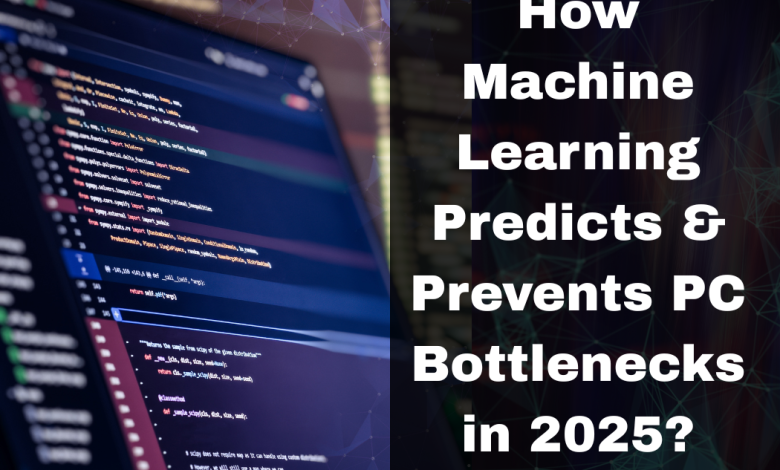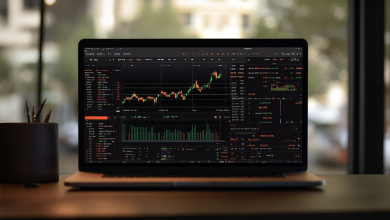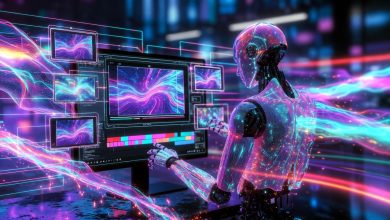
With the advancement in technology, the need and focus on PC performance optimization has also increased. Now, every PC user, like editors and gamers, does not compromise with slow or lagging PCs, right?
However, one issue that often disturbs all gamers and other people is the PC bottleneck. This issue reduces the speed and performance of the PC and affects working or gameplay. But in 2025, with machine learning predicting and preventing these PC bottlenecks has become a lot easier.
Machine learning is helping various engineers, gamers, and editors to detect problems before they get too serious. Basically, this model uses advanced algorithms and other factors that observe changes.
In this article, we will discuss in detail how machine learning is transforming PC performance and improving efficiency. So keep reading!
What is the PC Bottleneck?
Well, most of us already know about the PC bottleneck. However, if you are unaware, then here is a short detail about it. My friend! PC bottleneck is components compatibility issue with the computer.
In this issue, one component of the computer may not work properly with other components. This issue is related to the hardware instead of the software. There can be different types of PC bottlenecks. Here is a list of some of them:
- CPU Bottleneck
In a CPU bottleneck, the working of the CPU is compromised, which affects the working of the GPU and RAM.
- GPU Bottleneck
Most video editors face the GPU bottleneck issue. In this, their GPU has slow performance, which slows down rendering and exporting.
- RAM Bottleneck
When your RAM is slow, your computer shows issues in storing data, which affects the working of the CPU.
The Role of Machine learning in PC Performance?
Machine learning is making PC performance and optimization easy by adopting modern ways. Basically, it uses AI systems, algorithms, and a data database that make intelligent decisions. However, in traditional fixing, people often use guesswork or manual methods to fix issues. On the other hand, ML uses specific databases, patterns, and more to detect the issue before it affects your work.
Here is a breakdown of the role of machine learning in PC performance:
- It helps rectify bottleneck issues and compromised components.
- It dynamically allocates roles within the system to provide smooth performance and reduce workload.
- Now, machine learning also helps to detect the overheating risk by analyzing the system temperature. Then, it also adjusts the cooling system to avoid thermal throttling.
How does Machine Learning help to Predict PC Bottleneck?
Here is a detail of how machine learning is helping people to predict PC bottleneck issues.
Data Collection and Monitoring
The smart ML system analyzes and collects your system performance data. It monitors and collects information from CPU usage, RAM load, disk I/O, and GPU performance.
This information, which is collected in real-time, allows the ML system to notice how your PC is working.
Pattern recognition
Once all the data is collected, the ML system then analyzes the patterns. It checks the best performance and when the system is slow to relate it to the bottleneck issue.
Let’s understand it with an example. If your CPU works high while the GPU is normal, then the ML algorithm may mark it as a CPU bottleneck. So, you have to check and update your CPU for improved performance.
Previous Data Analysis
The machine learning also analyzes previous data charts and performances. It will help to know if there were any complaints of a bottleneck before, or what the reason was.
Moreover, it also observes the activity on the PC, like during video rendering, the workload of the GPU is increased. So the system will analyze it to determine if the bottleneck is due to workload or device malfunction.
Real-time Prediction
After the machine learning model is trained with the previous data collection and patterns, it will predict the real-time information. If the criteria meet the data for a bottleneck, then it may predict it as a bottleneck issue.
Advance Notification
However, if the ML system is trained enough, then it will also notify you about the bottleneck issue in advance. This smart move will help you take appropriate steps to avoid the issue.
Like, you can close unwanted applications, upgrade hardware, or adjust your device settings.
Tips to Prevent PC Bottleneck with Machine learning
Machine learning is transforming the way we analyze and prevent PC bottlenecks. Actually, they make bottleneck detection and management easy. Here are some tips on how you can use machine learning to prevent performance slowdown and bottlenecks:
- You can use machine learning to track real-time data and predict the bottleneck issue in advance.
- Machine learning also helps to prevent bottlenecks via a dynamic allocation process. It analyzes the workload and distributes the work between CPU, GPU, and RAM.
- You can also set up real-time alerts. These alarms will inform you when the system is nearing a critical limit. In this way, you can adjust the system to enhance performance.
- You can also train your ML system according to your personalized usage. So, the system will learn your usage pattern and automatically adjust itself.
- Over time, you should also upgrade your PC components and train your ML model. It will improve the accuracy and adapt to changes.
- You can also use cloud-based learning models to make work easier. With this system, you can integrate multiple PCs and check their performance.
Learn more about preventing PC bottlenecks with AI and ML at https://bottleneckcheck.com/
Comparison of Traditional and ML Ways in Preventing Bottlenecks
Here is a detailed table for you. It will help you to understand the difference between traditional and modern machine learning models in preventing bottlenecks.
| Feature | Traditional Methods | Machine Learning Methods |
| Data Collection | Manual monitoring tools or system logs | Automated, continuous real-time system performance data collection |
| Bottleneck Detection | Reactive detection based on symptoms or user complaints | Predictive analysis using historical and real-time data |
| Resource Allocation | Manual adjustments or upgrades (e.g., adding more RAM) | Dynamic and automatic resource allocation based on current workload |
| Thermal Management | Basic temperature monitoring with fixed cooling systems | ML predicts overheating and adjusts cooling systems in real-time |
| Adaptability | Limited to pre-set configurations | Real-time, adaptive adjustments based on system behavior and workload |
| User Interaction | Requires user intervention for troubleshooting | Minimal user input; system makes proactive adjustments automatically |
| Optimization Speed | Can be slow and reactive, requiring downtime for fixes | Proactive and instantaneous adjustments to prevent issues before they occur |
| Complexity in Setup | Simple but requires manual effort for monitoring and upgrades | Requires initial setup but automates performance monitoring and bottleneck prevention |
| Accuracy of Predictions | Low, as it is based on symptoms and manual checks | High, due to data-driven predictions and pattern recognition |
Conclusion
In the modern world, old ways of predicting and preventing the PC bottleneck are gone. Most people use advanced AI systems like machine learning to resolve all types of PC bottlenecks.
This smart system uses advanced algorithms that detect and analyze the PC data and patterns. This analysis will inform you about how to prevent the pc performance issue.
FAQs
Why is it important to prevent a PC bottleneck?
To increase the life of your PC and perform work smoothly, it is better to avoid the PC bottleneck problem.
What factors does Machine learning notice to detect a bottleneck?
Machine learning analyzes data from system components such as CPU usage, RAM load, disk I/O, GPU performance, and temperature. After that, it detects the early signs of a bottleneck.
Can machine learning help to prevent all types of PC bottlenecks?
No, ML learning mostly helps to prevent PC performance issues. The serious hardware bottleneck can only be treated by upgrading the component.
How accurate data does the ML model provide?
The ML model predicts highly accurate data due to its continuous data analysis and pattern recognition. The more data ML collects, the more accurate the results it shows.




